Abstract
Arthrobacter viscosus NRRL B-1973 produces its viscous extracellular polysaccharides (EPS) when grown on media containing xylose or enzymatic xylan hydrolysates. Crude EPS formation from xylose averaged 12 g/liter when initial culture pH was adjusted to 8.0 and total nitrogen was limited to 0.03%. Purified EPS from pentose and hexose substrates were analyzed for their monosaccharide, acetyl, and uronic acid components, intrinsic viscosities, and average molecular masses. Differences were apparent in degrees of acetylation, molecular masses, and intrinsic viscosities of the heteropolysaccharides produced on different carbon sources.
Full text
PDF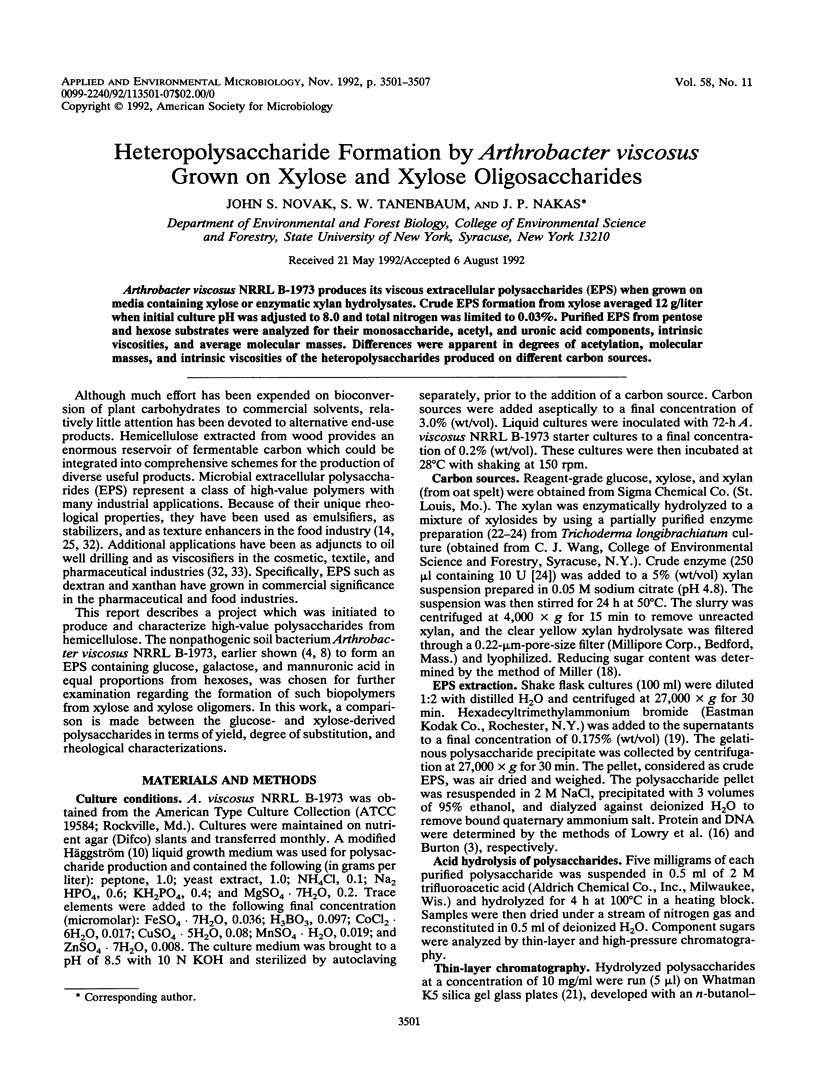
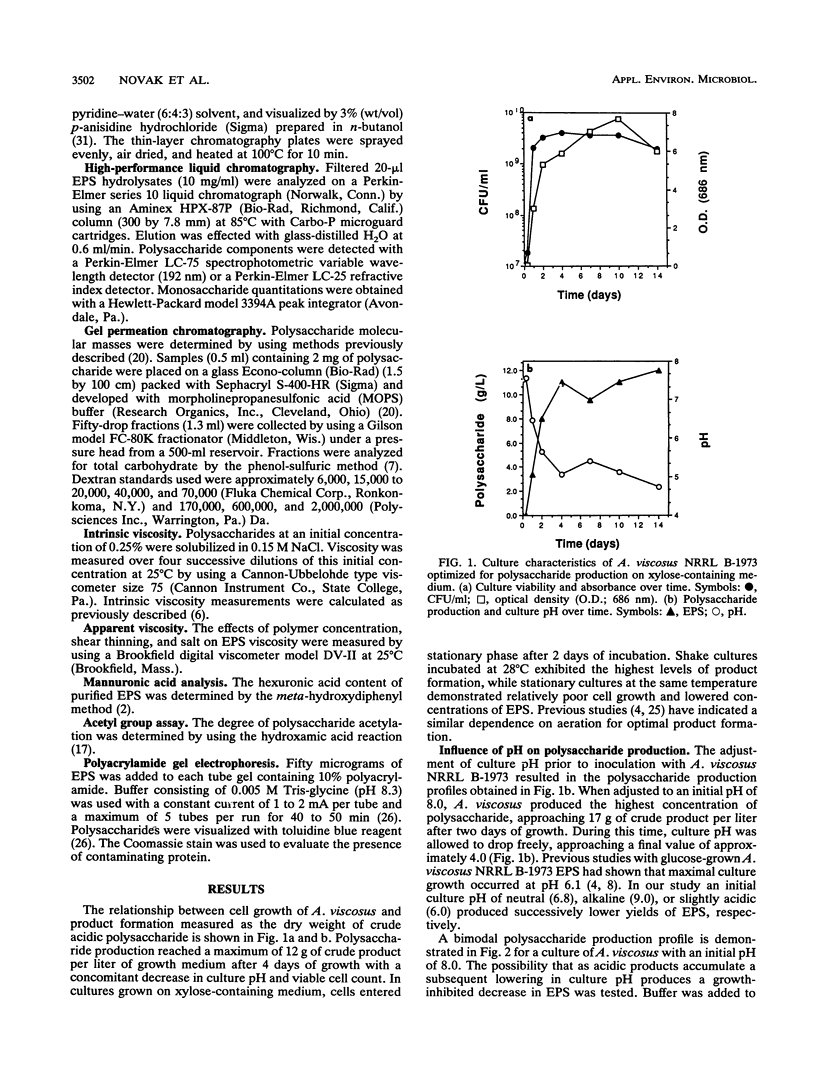
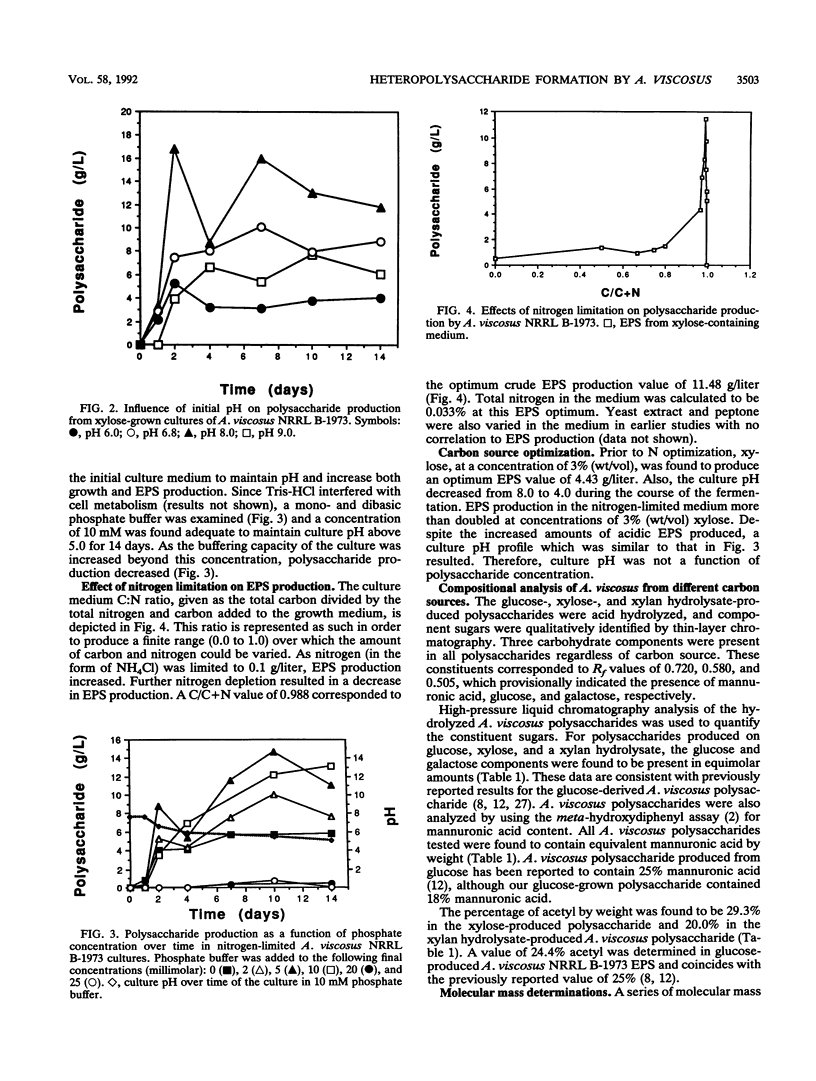
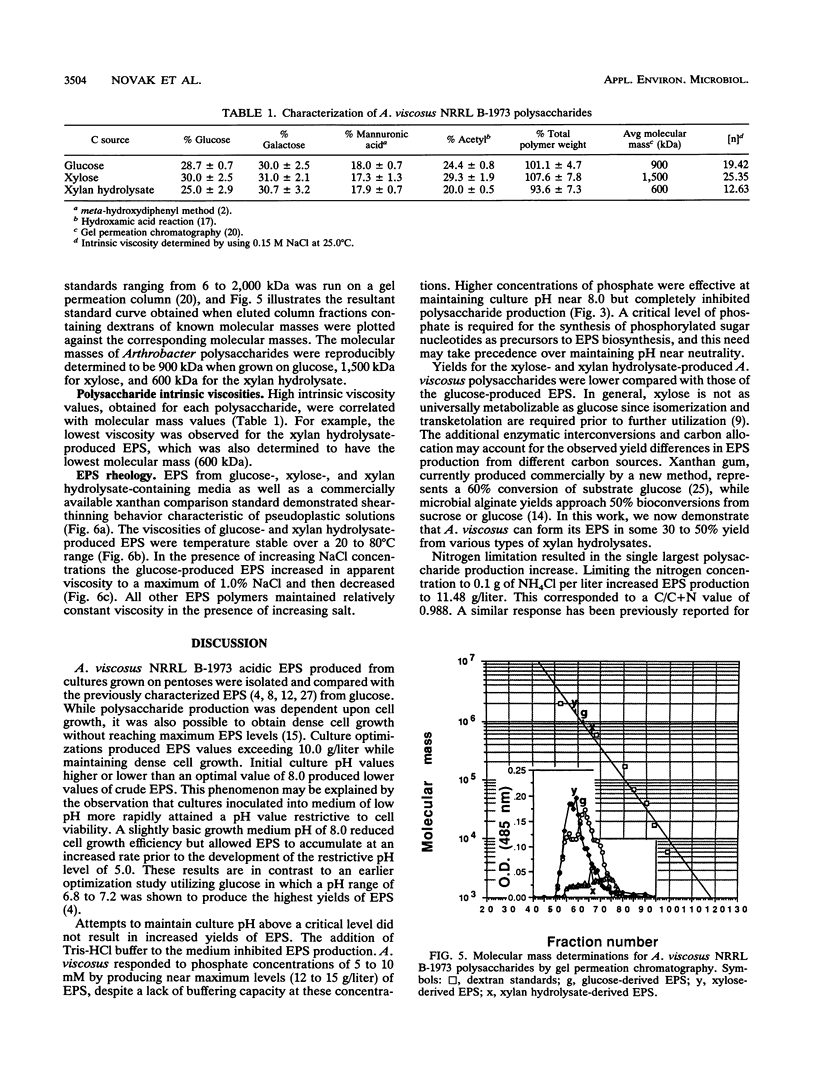
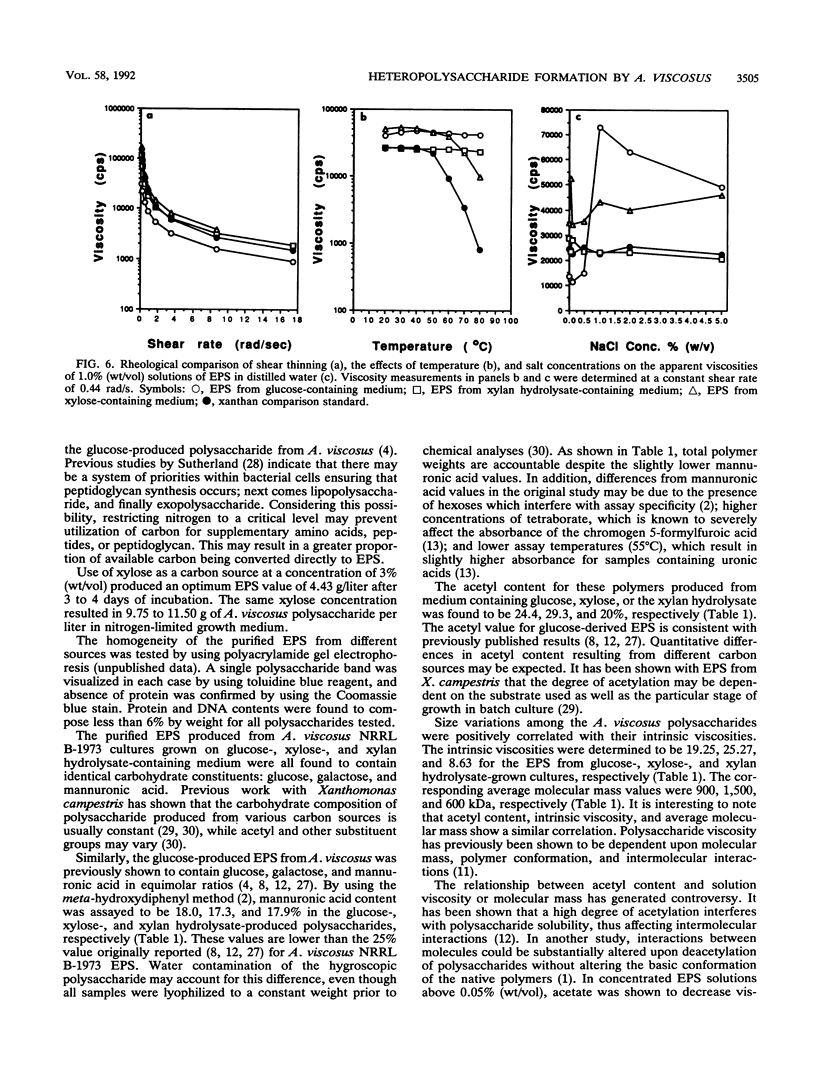
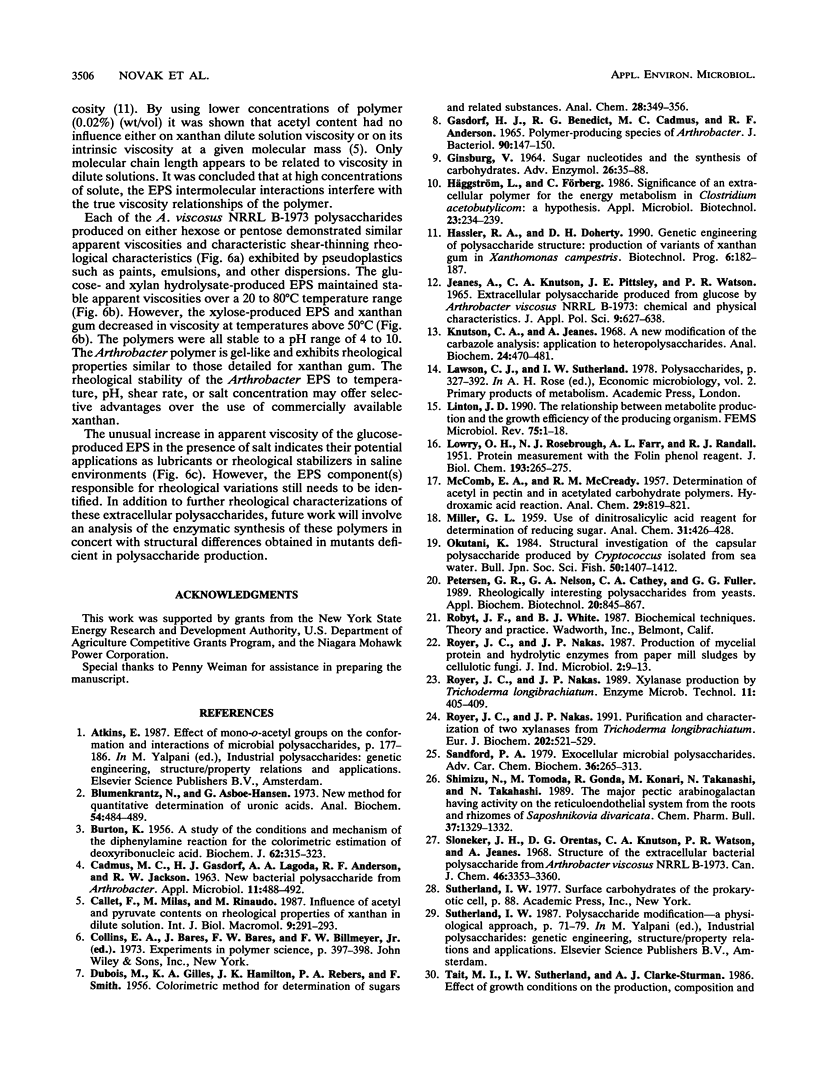

Selected References
These references are in PubMed. This may not be the complete list of references from this article.
- BURTON K. A study of the conditions and mechanism of the diphenylamine reaction for the colorimetric estimation of deoxyribonucleic acid. Biochem J. 1956 Feb;62(2):315–323. doi: 10.1042/bj0620315. [DOI] [PMC free article] [PubMed] [Google Scholar]
- Blumenkrantz N., Asboe-Hansen G. New method for quantitative determination of uronic acids. Anal Biochem. 1973 Aug;54(2):484–489. doi: 10.1016/0003-2697(73)90377-1. [DOI] [PubMed] [Google Scholar]
- CADMUS M. C., GASDORF H., LAGODA A. A., ANDERSON R. F., JACKSON R. W. NEW BACTERIAL POLYSACCHARIDE FROM ARTHROBACTER. Appl Microbiol. 1963 Nov;11:488–492. doi: 10.1128/am.11.6.488-492.1963. [DOI] [PMC free article] [PubMed] [Google Scholar]
- GINSBURG V. SUGAR NUCLEOTIDES AND THE SYNTHESIS OF CARBOHYDRATES. Adv Enzymol Relat Areas Mol Biol. 1964;26:35–88. doi: 10.1002/9780470122716.ch2. [DOI] [PubMed] [Google Scholar]
- Gasdorf H. J., Benedict R. G., Cadmus M. C., Anderson R. F., Jackson R. W. Polymer-Producing Species of Arthrobacter. J Bacteriol. 1965 Jul;90(1):147–150. doi: 10.1128/jb.90.1.147-150.1965. [DOI] [PMC free article] [PubMed] [Google Scholar]
- Hassler R. A., Doherty D. H. Genetic engineering of polysaccharide structure: production of variants of xanthan gum in Xanthomonas campestris. Biotechnol Prog. 1990 May-Jun;6(3):182–187. doi: 10.1021/bp00003a003. [DOI] [PubMed] [Google Scholar]
- Knutson C. A., Jeanes A. A new modification of the carbazole analysis: application to heteropolysaccharides. Anal Biochem. 1968 Sep;24(3):470–481. doi: 10.1016/0003-2697(68)90154-1. [DOI] [PubMed] [Google Scholar]
- LOWRY O. H., ROSEBROUGH N. J., FARR A. L., RANDALL R. J. Protein measurement with the Folin phenol reagent. J Biol Chem. 1951 Nov;193(1):265–275. [PubMed] [Google Scholar]
- Linton J. D. The relationship between metabolite production and the growth efficiency of the producing organism. FEMS Microbiol Rev. 1990 Mar;6(1):1–18. doi: 10.1111/j.1574-6968.1990.tb04083.x. [DOI] [PubMed] [Google Scholar]
- Petersen G. R., Nelson G. A., Cathey C. A., Fuller G. G. Rheologically interesting polysaccharides from yeasts. Appl Biochem Biotechnol. 1989;20-21:845–867. doi: 10.1007/BF02936530. [DOI] [PubMed] [Google Scholar]
- Royer J. C., Nakas J. P. Purification and characterization of two xylanases from Trichoderma longibrachiatum. Eur J Biochem. 1991 Dec 5;202(2):521–529. doi: 10.1111/j.1432-1033.1991.tb16404.x. [DOI] [PubMed] [Google Scholar]
- Sandford P. A. Exocellular, microbial polysaccharides. Adv Carbohydr Chem Biochem. 1979;36:265–313. doi: 10.1016/s0065-2318(08)60238-3. [DOI] [PubMed] [Google Scholar]
- Shimizu N., Tomoda M., Gonda R., Kanari M., Takanashi N., Takahashi N. The major pectic arabinogalactan having activity on the reticuloendothelial system from the roots and rhizomes of Saposhnikovia divaricata. Chem Pharm Bull (Tokyo) 1989 May;37(5):1329–1332. doi: 10.1248/cpb.37.1329. [DOI] [PubMed] [Google Scholar]


